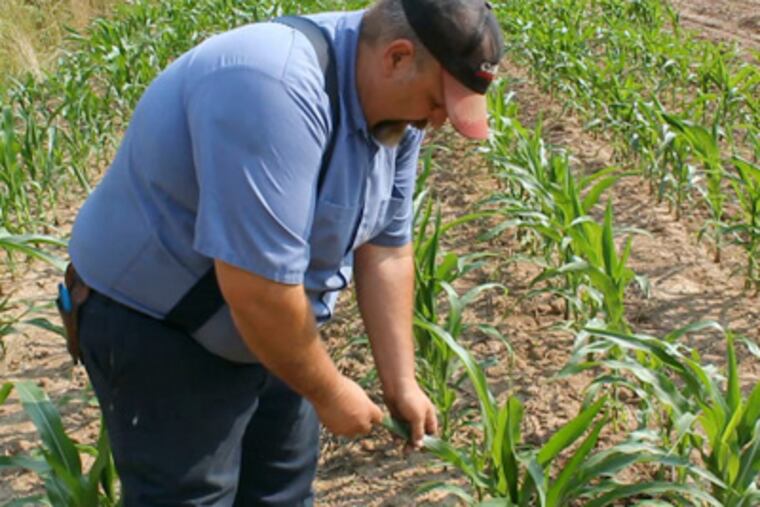Hot and dry weather is starting to worry some farmers
Hot and dry conditions are beginning to worry some farmers in Southeastern Pennsylvania and South Jersey. If rains don't pick up, arid weather could hurt field crops such as soy beans and feed corn, which typically are not irrigated, farmers say. Those who water their crops - mainly vegetable growers - are less affected but still watching the skies for a bit of relief.

Hot and dry conditions are beginning to worry some farmers in Southeastern Pennsylvania and South Jersey.
If rains don't pick up, arid weather could hurt field crops such as soy beans and feed corn, which typically are not irrigated, farmers say. Those who water their crops - mainly vegetable growers - are less affected but still watching the skies for a bit of relief.
This year's growing season has been a series of ups and downs for most farmers. Heavy rains saturated fields in late May, forcing many growers to plant corn and soybeans late. Next came a dry spell that lasted until July 8, when three inches of rain dropped in most parts of South Jersey and Southeastern Pennsylvania.
Field-crop farmers in both regions said conditions were not dire yet, but heat and parched soil has stunted the growth of some of their crops.
The plants "jumped out of the ground, but after that, they slowed up because we weren't getting the rain," said Mark Scheetz, president of the Bucks County Farm Bureau. "The corn was really showing the stress of it . . . the leaves were starting to roll."
This week's forecast promises more hot, dry conditions, according to the National Weather Service.
Bill Bamka, an agricultural consultant with the Rutgers Cooperative Extension of Burlington County, said weather had weighed heavy on the minds of most growers he works with.
"Every time I stop at a farm, that's the subject: When are we going to get rain?" he said.
The brief downpour July 8 moistened fields and granted many farmers a reprieve, but a week of dry weather followed.
"These last few showers have kept things at bay, but there is concern about dryness," Bamka said.
The spotty showers helped some farms but missed others, including Howard Robinson's farm in Chester County.
Without more rain, the dry soil could result in reduced crop yields, according to Andrew Frankenfield, an agricultural educator with Pennsylvania State University's Montgomery County extension. At this point in the growing season, corn needs moisture to develop kernels, he said.
Low yields would mean regional corn and soy farmers miss out on higher-than-normal prices resulting from droughts and flooding elsewhere in the country, especially the South and Midwest.
Also, poor crops might force local farmers to incur costs buying feed for animals.
"Hopefully rain will come and will allow for a harvestable crop, and it won't be a total loss," Frankenfield said.
Some farmers, especially those growing berries, fruits, vegetables and sweet corn, are using irrigation to supplement Mother Nature.
Roughly 25 percent of the farms in Burlington, Camden and Gloucester Counties irrigated crops in 2007, according to U.S. Census Bureau statistics. About 14 percent of farms used irrigation in Bucks, Chester, Delaware, Montgomery, and Philadelphia Counties that year, according to the bureau.
Dan Graiff, a South Jersey farmer who grows spinach and baby arugula in Vineland, said he preferred dry conditions because heavy rains oversaturate the soil, invite water-borne diseases, and make planting difficult.
"I don't pray for rain during our season," he said. "I'd rather not have it and irrigate."
Watering crops manually drives up Graiff's labor and gas expenses, but his fields are relatively small at about 200 acres total, and his small crops require only a small amount of hydration.
The cost for larger farms can be burdensome. Keith Dickinson, an agricultural educator with Pennsylvania State University's Chester County extension, said high fuel prices this year made irrigation more expensive than usual.
And irrigation doesn't protect crops vulnerable to heat. Gary Manoff, a fruit and berry farmer in Solebury, Bucks County, said the hot weather was good for his peach trees but could stress other plants, affecting the development of fruit.
Joe Donio, a farmer in Hammonton, Atlantic County, said the heat had hurt his blueberries.
"It's making the berries a little bit soft," he said. "It's pretty brutal."
While dry weather presents a farming challenge, as of last week, many crops in the region weren't lagging too far behind, said James Dunn, an agricultural economist at Pennsylvania State University.
"These crops by and large are pretty hearty, and they catch up fast," he said. "If we get . . . some timely rains, and some good weather, we could have a very nice crop this year."
See how local farmers are coping with the hot, dry weather in a video at www.philly.com/farmersEndText